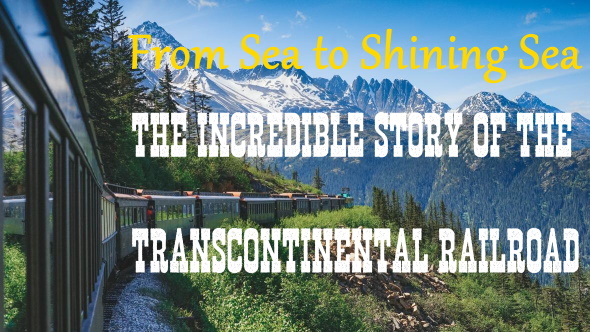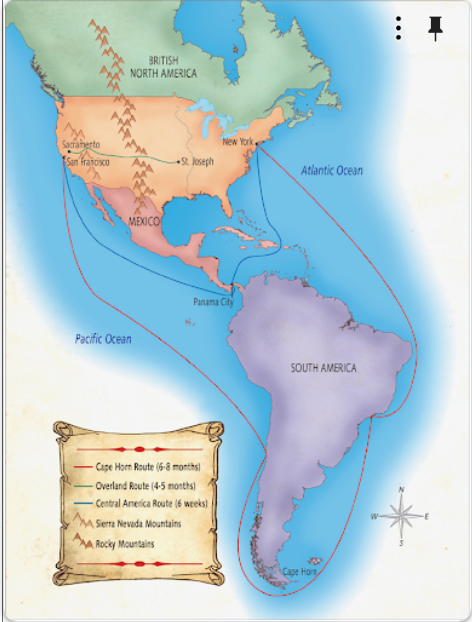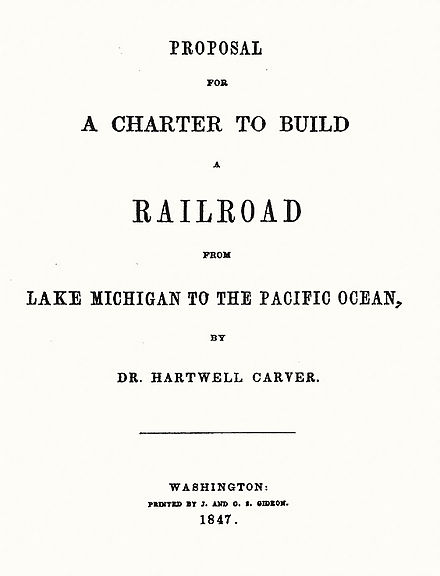 Chapter I: A Railroad to the Moon
I: Blowing off steam: Crazy Judah
The necessity that now exists for constructing lines of railroad and telegraphic communication between the Atlantic and Pacific coasts of this continent is no longer a question for argument; it is conceded by every one. In order to maintain our present position on the Pacific, we must have some more speedy and direct means of intercourse than is at present afforded by the route through the possessions of a foreign power. (Report by the Select Committee on the Pacific Railroad and Telegraph, the US House of Representatives, August 1865)
Chapter I: A Railroad to the Moon
I: Blowing off steam: Crazy Judah
The necessity that now exists for constructing lines of railroad and telegraphic communication between the Atlantic and Pacific coasts of this continent is no longer a question for argument; it is conceded by every one. In order to maintain our present position on the Pacific, we must have some more speedy and direct means of intercourse than is at present afforded by the route through the possessions of a foreign power. (Report by the Select Committee on the Pacific Railroad and Telegraph, the US House of Representatives, August 1865)
Imagine what it was like back then. No roads at all. None. if you wanted to get anywhere you went by horse, through often hostile territory, taking your life in your hands, traversing prairies and wild fields and mountains, making a trip to the next town dangerous and a trip to the next state almost out of the question. If you couldn’t or didn’t want to ride a horse you had few alternatives: go in a wagon or on a stagecoach, but neither of these were any safer than going it alone, and in some ways less comfortable too. Stagecoaches were not known for their luxury, and the dirt tracks they bumped and jolted over on the often days-long journeys were as likely to turn a wheel or lame a horse and cause the vehicle either to crash or make an unscheduled stop. With the sort of folk out on the roads those days looking for easy prey, this was never a good idea.
There was a reason why no stagecoach driver would travel unarmed (this quite possibly giving rise to the term, “riding shotgun”), but even his best efforts would not matter much if the stagecoach was jumped by a bunch of bandits or desperadoes, or worse, a party of Indian warriors. Few of the passengers could be expected to defend the stagecoach, and a large proportion of those were women, who, really, back in those times did not carry guns, nor were they expected to. Even if they did, few knew how to use them and particularly under pressure. An attack on a stagecoach could very easily mean that nobody was ever going to reach their destination, especially as these often carried valuable items such as gold or silver, perhaps going from a bank in one town to another, or being delivered for a payroll.
Then there were the longer journeys, the ones that couldn’t realistically be made even by stage, where sea travel was the only option. Ships were at the time still pretty much using sail - steam would not really get a grip on the world of shipping for another twenty or thirty years - and apart from the many perils with which such a voyage was fraught (Cape Horn at the tip of South America, a necessary transit point for shipping going from west to east, was notorious for its vicious weather, and many ships had been lost trying to navigate around it), these excursions usually took about six to eight months, depending on weather and other factors, so a man could theoretically spend a year going from, say, New York to California and back.
And in 1849, everyone suddenly wanted to go to California.
This was, of course, due to what became known as the California Gold Rush, when, in 1848, gold was discovered in Sacramento, then a sleepy little town, and triggered the exodus of adventurers and prospectors in search of their fortune. Few if any made it, but the journey still had to be made, and that meant either a very long and torturous overland passage to Panama, to catch a ship going north, or, as mentioned, braving the horrors of the Cape.

There was, therefore, very much a need to find a safer way for folks to travel. While hardy pioneers, as related in previous posts, would pile all their worldly into covered wagons and set out for the new frontier, your average city-dweller preferred to travel in relative safety and if possible comfort. As early as 1838, even before the historic discovery of gold in the west, a railroad surveyor called John Plumbe had approached Congress with the idea of laying rail tracks from the east all the way to the Pacific. He was laughed out of the place, an unnamed member sneering that his proposal would be akin to “building a railroad to the moon.”
 Asa Whitney (1797 - 1872)
Asa Whitney (1797 - 1872)
Others tried to convince a skeptical congress of the benefits of, even the absolute necessity for, a railroad linking all of America. Asa Whitney was a merchant tradesman who made his fortune in China, where he emigrated after losing two wives and his general goods business. Returning a wealthy man, and marrying his third wife, he began considering how a transcontinental railroad would help shorten the long and tedious journey by sea to China, by allowing people to take a train across the east to the west coast and there board a ship for China, thus cutting the journey by sea considerably. He made detailed surveys and maps, proposed projects and wrote to congress in 1849, but possibly due to his emphasis on the railroad benefiting those who wished to sail to China, the government turned a deaf ear and was not interested.
Though he gave up in 1851, Whitney would live to see his idea come to pass, as the Central Pacific Railroad was built and was operating before he died. Whether he felt frustration at having been passed over by history, as one of the original progenitors of the idea, or not, is not recorded, but I guess he must have been happy for all those folks going to China at least.

Congress had changed their tune not ten years later, when one member (again, so far as I can see, unnamed) declaimed the wonderful vision of what the Indians would know and fear as “the iron horse”, a marvel of modern - and, importantly, of course, American - engineering and ingenuity.
The Iron Horse with the wings of wind, his nostrils distended with flame, vomiting fire and smoke, trembling with power … flies from one end of the continent to the other in less time than our ancestry required to visit a neighboring city.